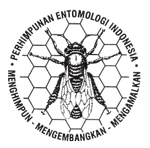Pengaruh lama ketiadaan inang terhadap kapasitas reproduksi parasitoid Snellenius manilae Ashmead (Hymenoptera: Braconidae)
DOI:
https://doi.org/10.5994/jei.9.1.14Keywords:
host parasitoid interaction, reproductive capacity, ovipositionAbstract
The objective of this research was to study the influence of host deprivation on the oviposition and physiological condition of Snellenius manilae Ashmead. The research was conducted at Laboratory of Bioecology of Parasitoid and Predator, Department of Plant Protection, Faculty of Agriculture, IPB. Ten parasitoids of the same age and cohort were used in this experiment. Deprivation of hosts were done for 1, 2, 3, 4, 5, 6 and 7 days at the beginning and toward the end of their life. All hosts were replaced every 24 hours. Result indicated that host deprivation affects the reproductive capacity of Snellenius manilae. Even though parasitoids were able to lay eggs even when they were deprived of hosts for seven consecutive days, the overall results of host deprivation experiment showed that the length and timing of deprivation period can affect reproductive capacity. Deprivation of hosts tends to increase the parasitism rate and the numbers of eggs laid upon their first encounter of hosts after the treatment. The difference is more pronounced on treatements that allowed parasitism to occur before the deprivation treatment. However, the overall results suggests that deprivation overall decrease the reproductive capacity of the parasitoid. The longevity of deprived individuals was also lengthened. Parasitoids that were given host before deprivation treatments tend to produced more eggs than those were not. These results showed that deprivation of hosts in the field may affect the effectiveness of parasitoids and the success of biological control.
Downloads
Downloads
Published
How to Cite
Issue
Section
License
Authors who publish with this journal agree to the following terms:
- Authors retain copyright and grant the journal right of first publication with the work simultaneously licensed under a Creative Commons Attribution 4.0 International License that allows others to share the work with an acknowledgement of the work's authorship and initial publication in this journal.
- Authors are able to enter into separate, additional contractual arrangements for the non-exclusive distribution of the journal's published version of the work (e.g., post it to an institutional repository or publish it in a book), with an acknowledgement of its initial publication in this journal.
- Authors are permitted and encouraged to post their work online (e.g., in institutional repositories or on their website) prior to and during the submission process, as it can lead to productive exchanges, as well as earlier and greater citation of published work (See The Effect of Open Access).








